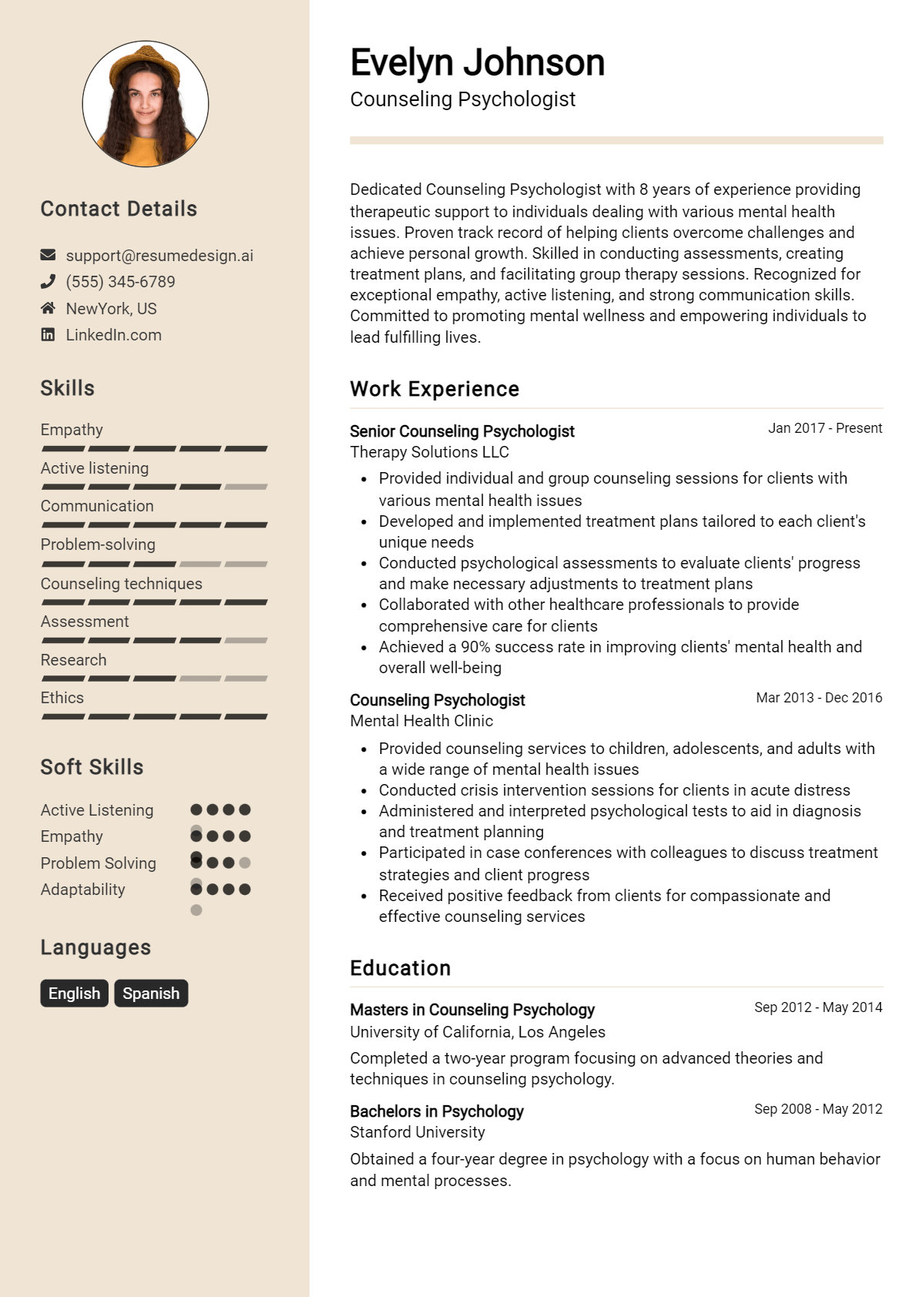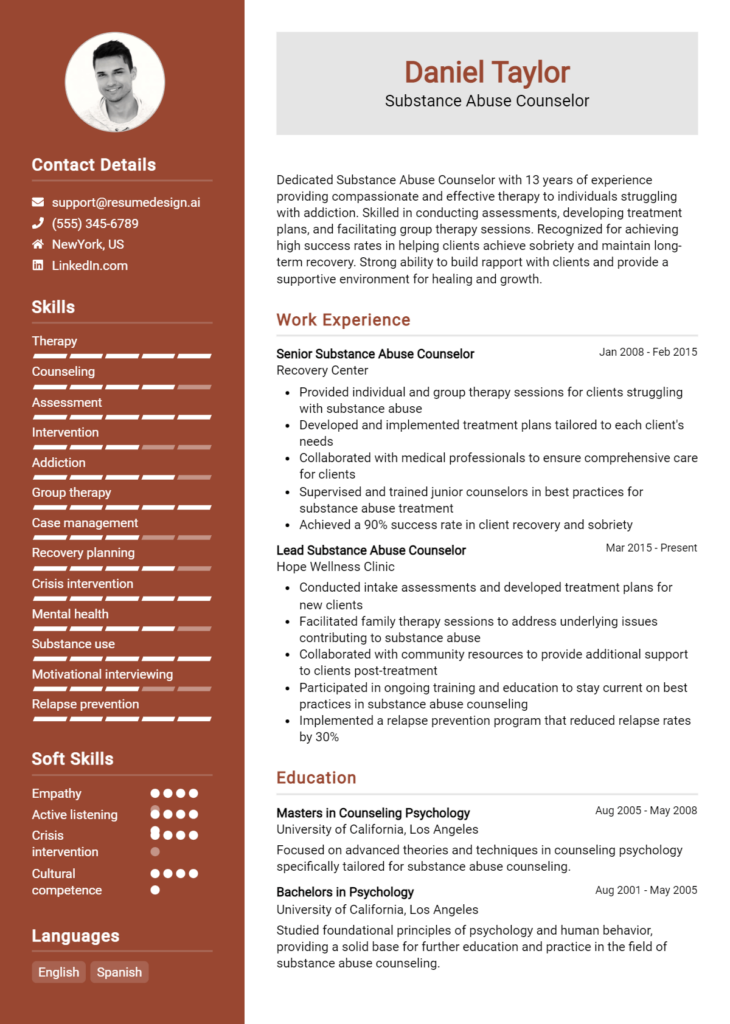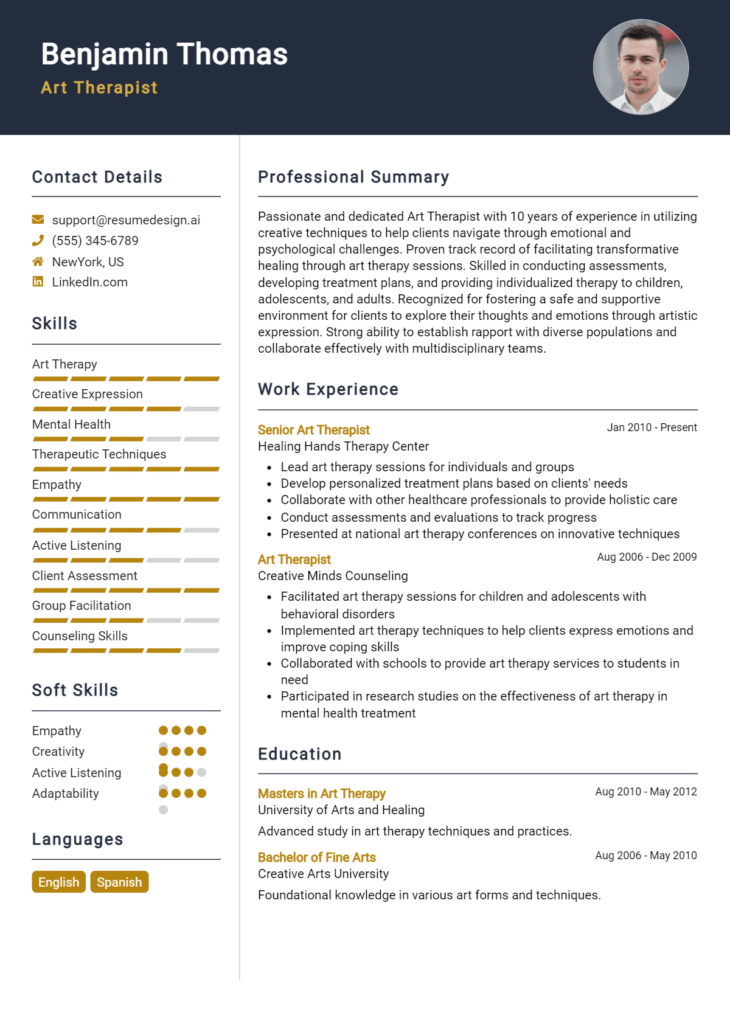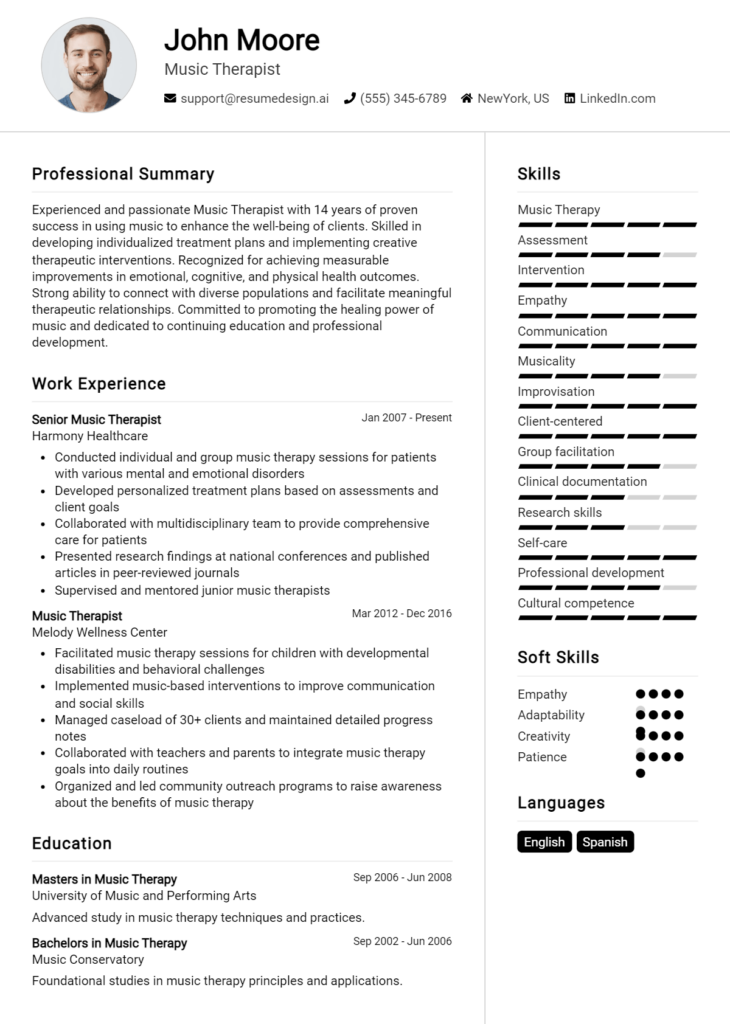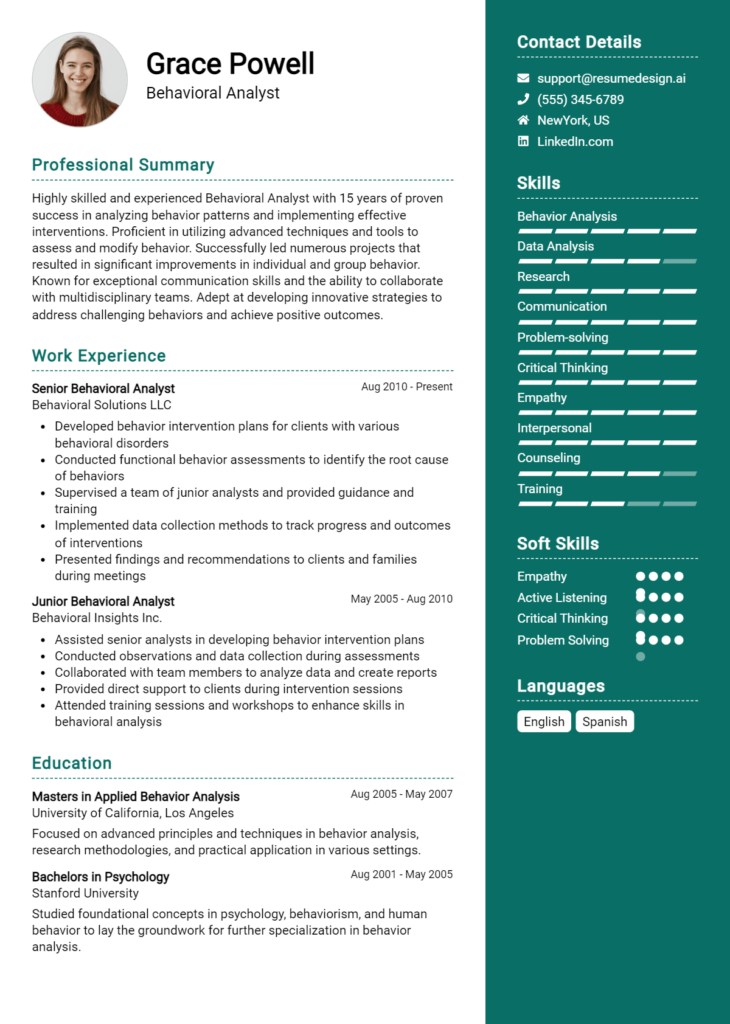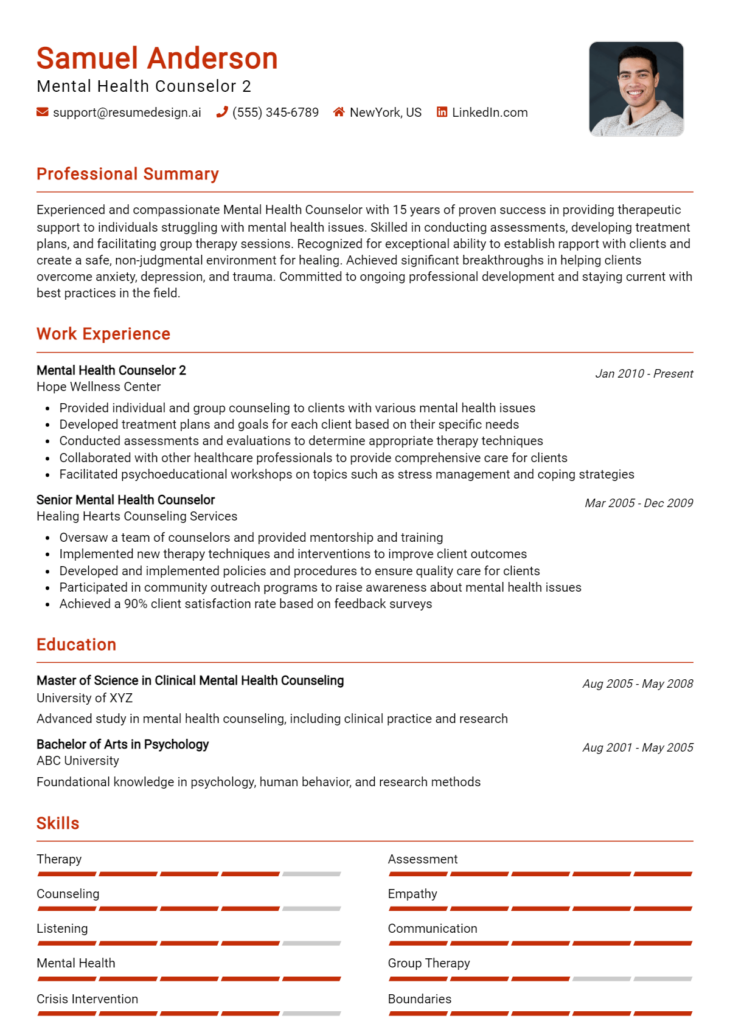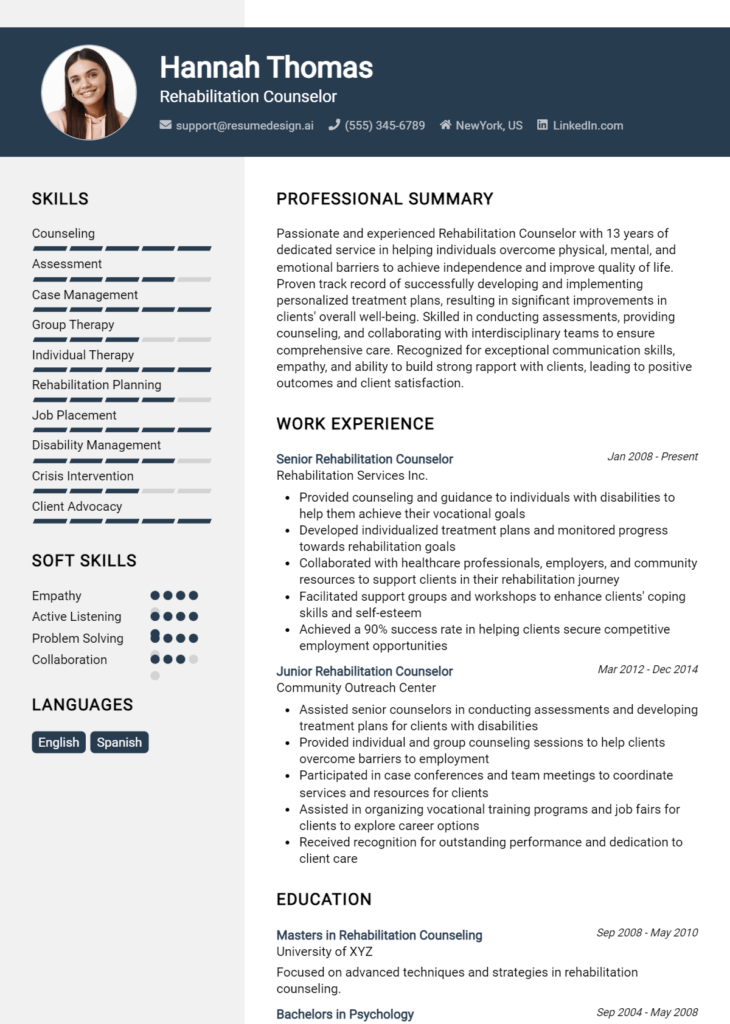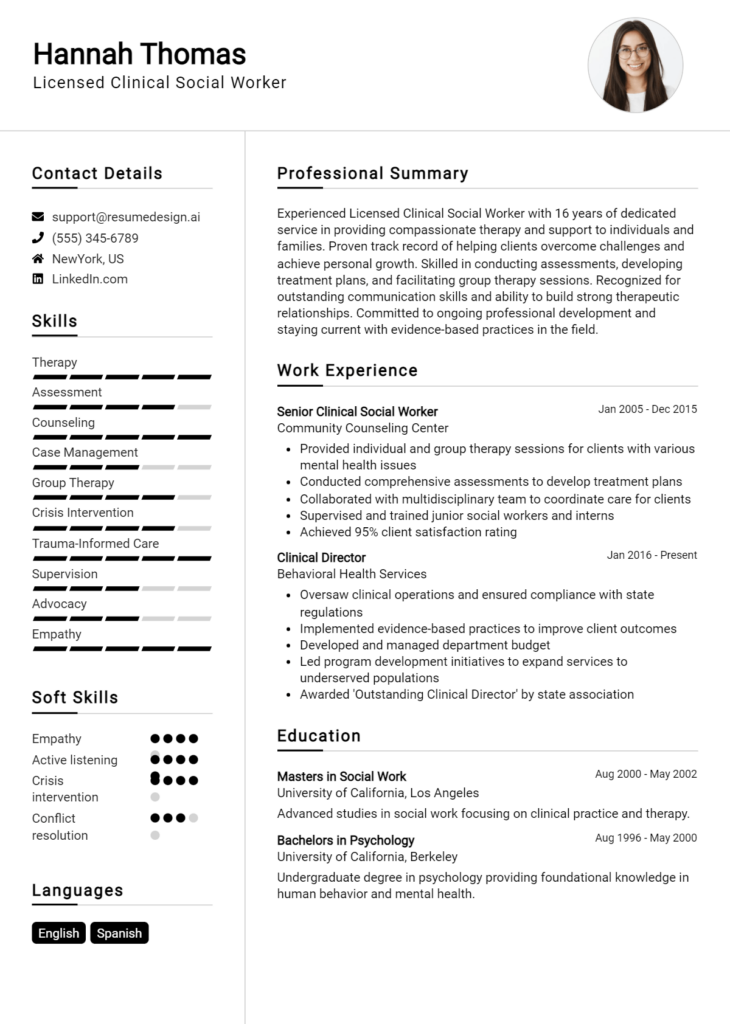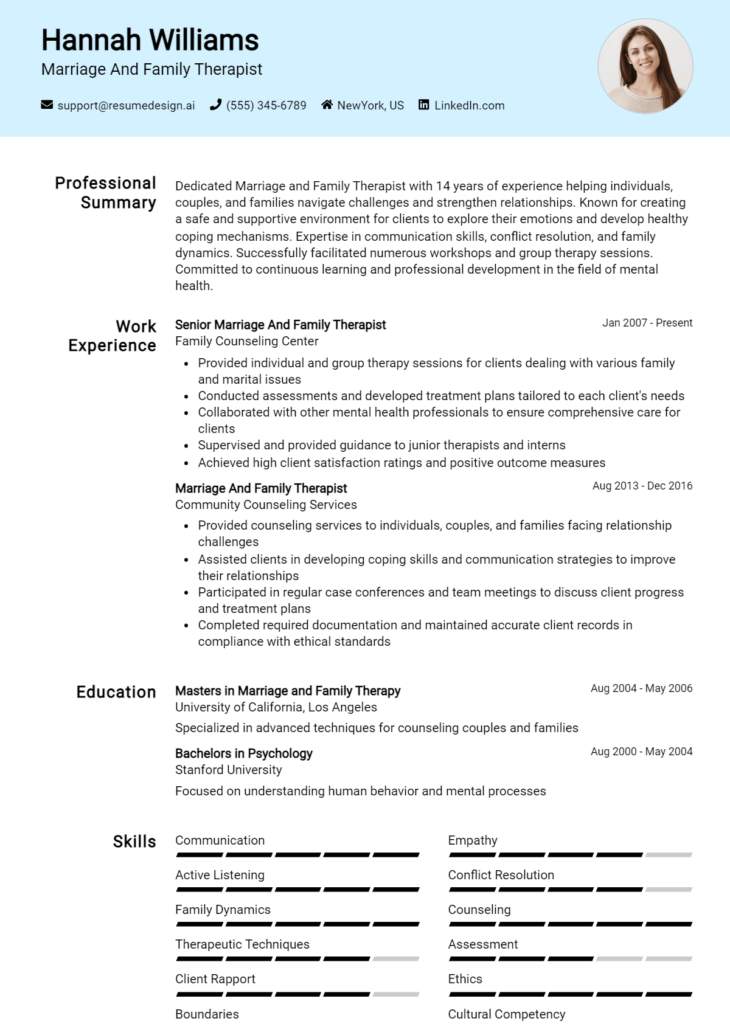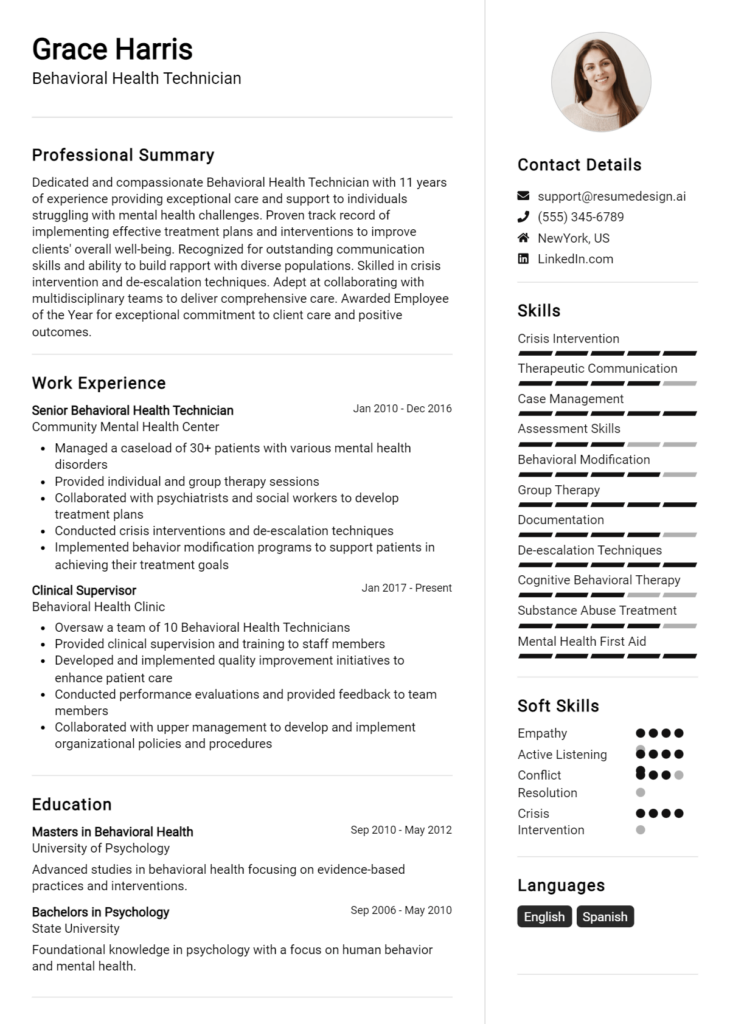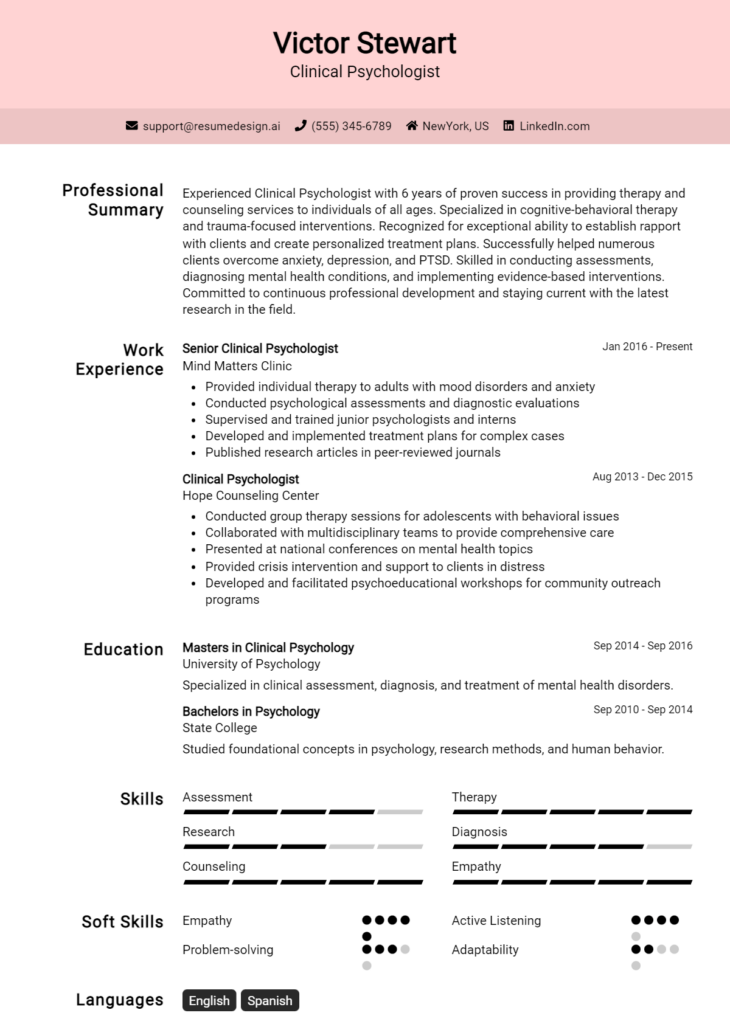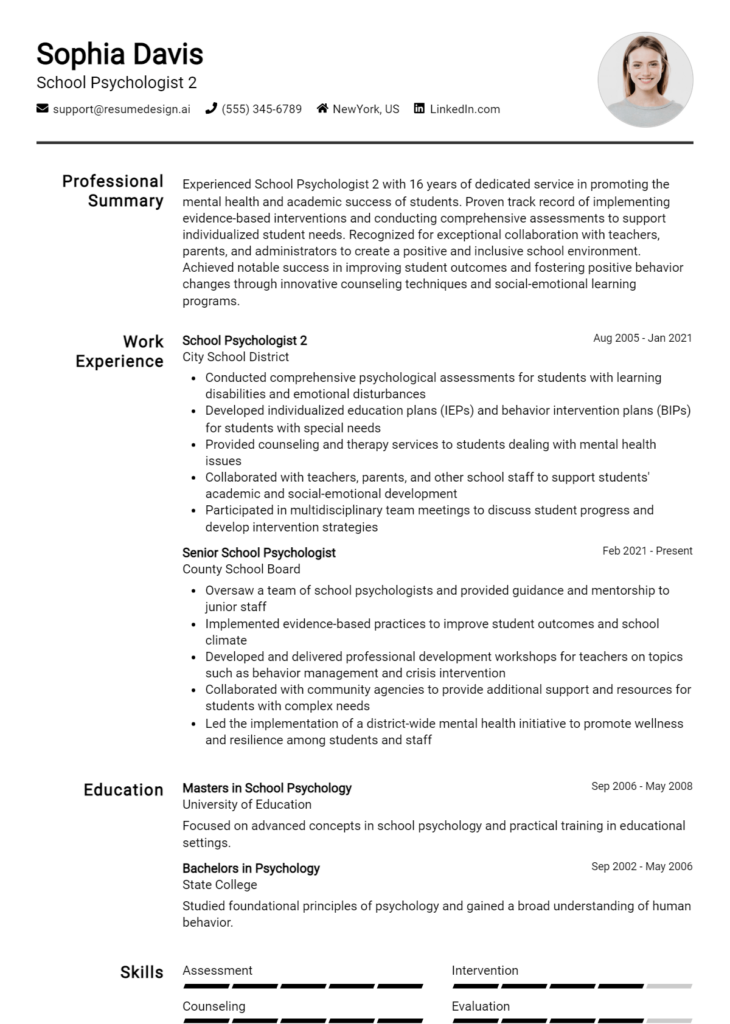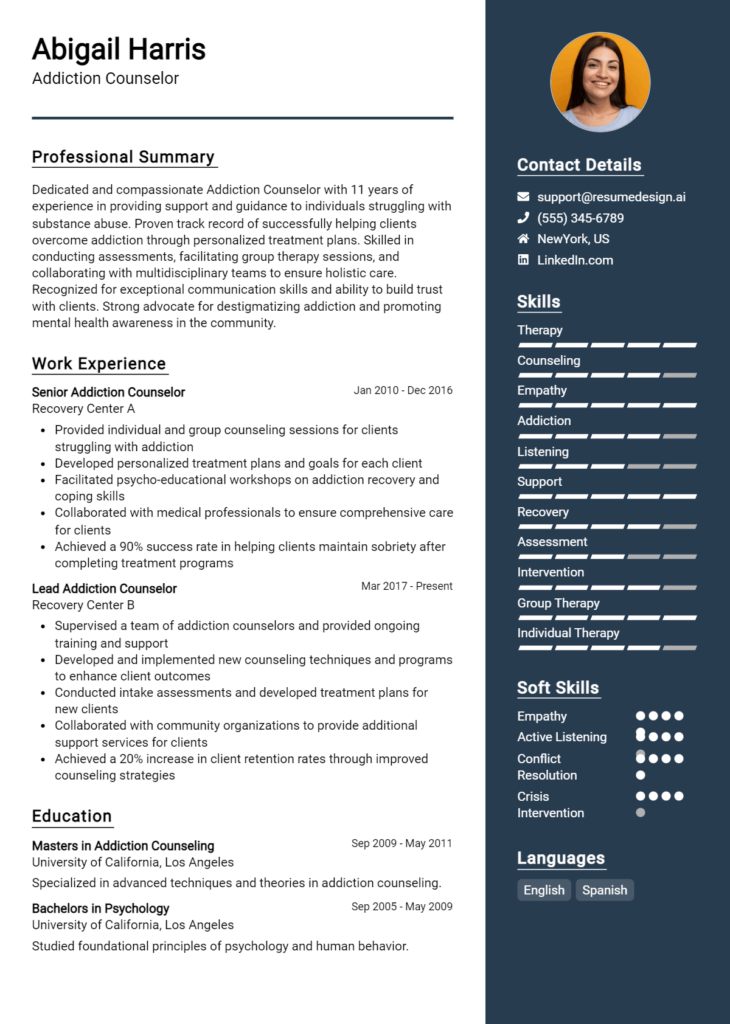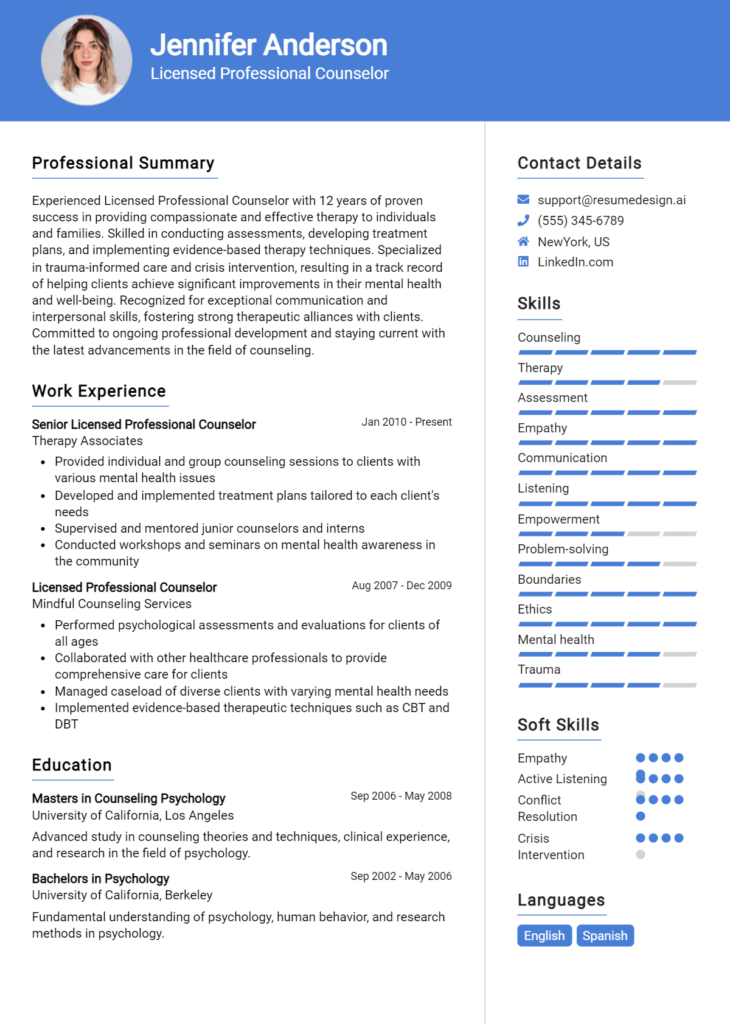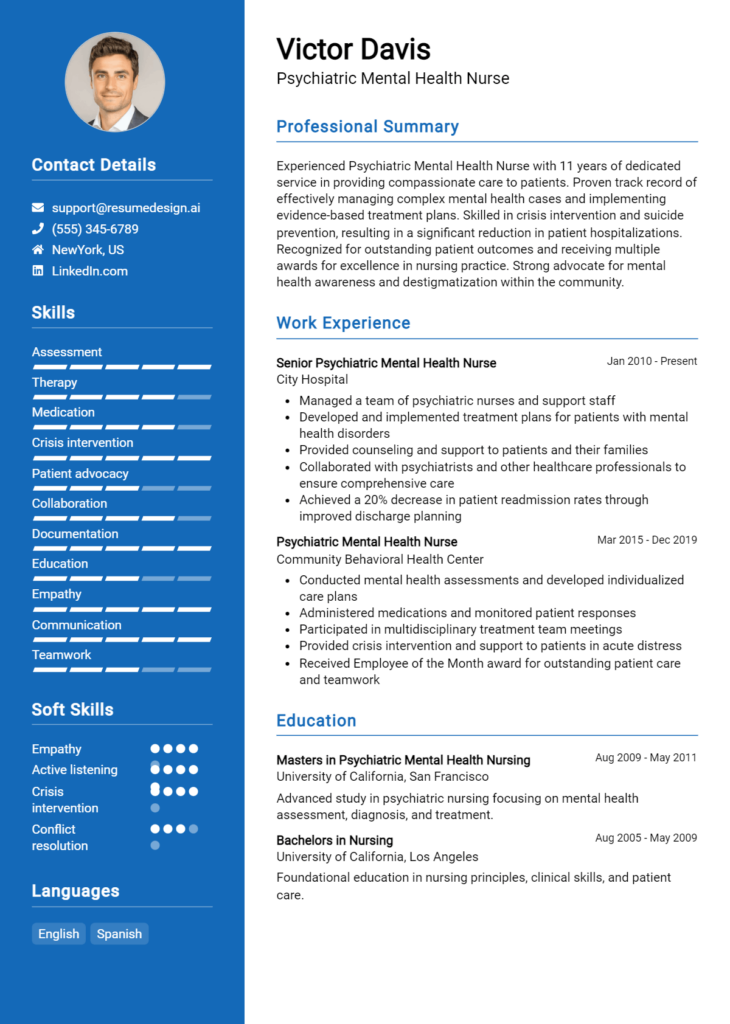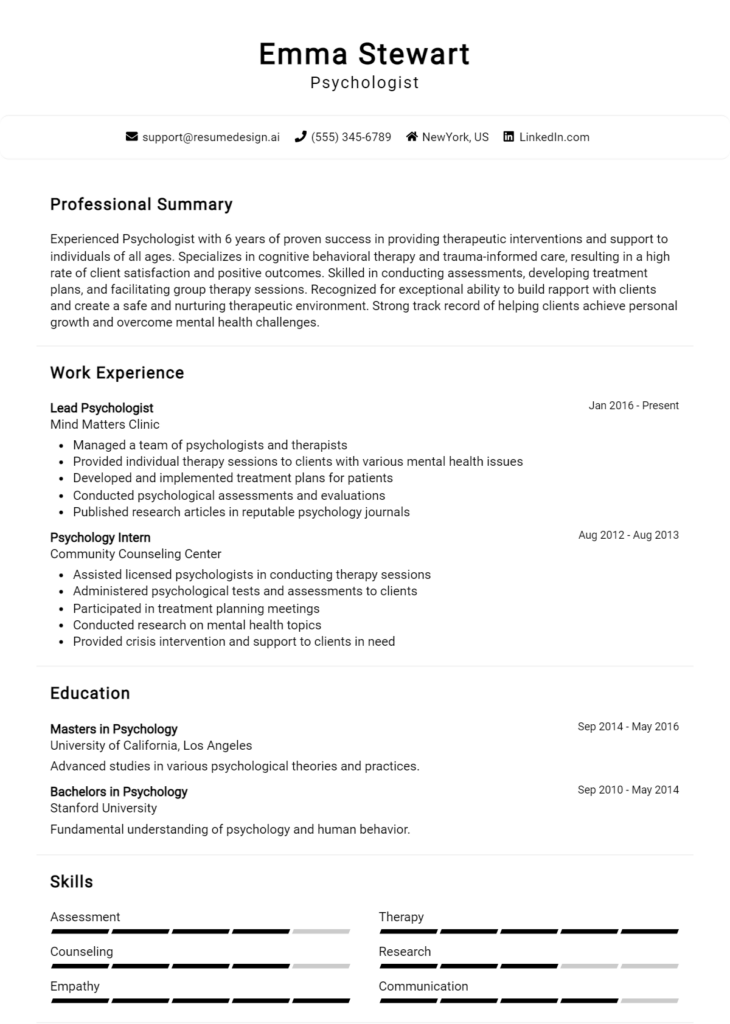Counseling Psychologist Core Responsibilities
A Counseling Psychologist plays a pivotal role in mental health by providing therapeutic support and guidance to individuals facing psychological challenges. Key responsibilities include conducting assessments, developing treatment plans, and facilitating therapy sessions. Essential skills encompass strong interpersonal communication, active listening, and problem-solving abilities, allowing the psychologist to effectively bridge departments such as healthcare, education, and social services. A well-structured resume can highlight these qualifications, showcasing how these competencies contribute to the organization’s overall goals of enhancing mental well-being.
Common Responsibilities Listed on Counseling Psychologist Resume
- Conduct psychological assessments and evaluations to identify client needs.
- Develop and implement individualized treatment plans.
- Provide individual and group therapy sessions.
- Maintain accurate and confidential client records.
- Collaborate with healthcare providers, educators, and families.
- Monitor client progress and adjust treatment strategies as needed.
- Educate clients on coping strategies and mental health resources.
- Participate in professional development and training opportunities.
- Advocate for clients’ mental health needs within the community.
- Stay updated on psychological research and best practices.
- Conduct workshops and seminars on mental health awareness.
High-Level Resume Tips for Counseling Psychologist Professionals
In the competitive field of counseling psychology, a well-crafted resume is essential for making a strong first impression on potential employers. Your resume serves as your personal marketing tool, showcasing your skills, experiences, and achievements to effectively communicate your suitability for the role. It is crucial that your resume not only highlights your qualifications but also reflects your understanding of the unique demands of the counseling profession. This guide will provide practical and actionable resume tips specifically tailored for Counseling Psychologist professionals, helping you stand out in a crowded job market.
Top Resume Tips for Counseling Psychologist Professionals
- Tailor your resume to each job application by closely aligning your skills and experiences with the specific requirements outlined in the job description.
- Highlight relevant clinical experiences, including internships and practicum placements, to demonstrate your hands-on skills in counseling settings.
- Quantify your achievements where possible, such as noting the number of clients successfully counseled or improvements in client outcomes.
- Emphasize your proficiency in various therapeutic modalities and approaches, showcasing your versatility in dealing with diverse populations.
- Include any certifications, licenses, or specialized training that enhance your qualifications and demonstrate your commitment to professional development.
- Showcase your communication and interpersonal skills, which are vital in building rapport with clients and colleagues alike.
- Incorporate volunteer work or community involvement that reflects your dedication to mental health advocacy and service.
- Utilize clear and concise language, avoiding jargon while ensuring that your resume is easy to read and understand.
- Consider adding a summary statement at the top of your resume that captures your professional identity and key strengths as a Counseling Psychologist.
By implementing these tips, you can significantly increase your chances of landing a job in the Counseling Psychologist field. A targeted and well-structured resume not only showcases your qualifications but also conveys your passion for helping others, making you a compelling candidate for potential employers.
Why Resume Headlines & Titles are Important for Counseling Psychologist
In the competitive field of counseling psychology, a well-crafted resume headline or title serves as a critical first impression for hiring managers. A strong headline can instantly capture attention and succinctly communicate a candidate's key qualifications, making it easier for employers to recognize the value the applicant brings to their organization. By encapsulating essential skills, relevant experience, and professional achievements in a clear and impactful phrase, a compelling headline can set the tone for the entire resume. It is essential that this headline is concise, relevant, and directly aligned with the job being applied for, ensuring it resonates with the specific requirements of the role.
Best Practices for Crafting Resume Headlines for Counseling Psychologist
- Keep it concise: Aim for one impactful phrase that summarizes your expertise.
- Be specific: Tailor your headline to reflect the particular role you are applying for.
- Highlight key strengths: Focus on your most relevant skills and experiences.
- Use action-oriented language: Employ strong verbs to convey your capabilities.
- Incorporate keywords: Utilize industry-related terms that align with the job description.
- Reflect your qualifications: Ensure the headline represents your professional credentials clearly.
- Avoid jargon: Use clear language that can be easily understood by all readers.
- Test it: Share your headline with peers or mentors for feedback to improve clarity and impact.
Example Resume Headlines for Counseling Psychologist
Strong Resume Headlines
Compassionate Counseling Psychologist with 8+ Years of Experience in Trauma-Informed Care
Licensed Clinical Psychologist Specializing in Adolescent Mental Health and Cognitive Behavioral Therapy
Dedicated Psychologist with Proven Success in Developing Effective Therapeutic Strategies for Diverse Populations
Weak Resume Headlines
Psychologist Seeking a Job
Experienced Professional Looking for Opportunities
The strong headlines are effective because they are specific, directly addressing the qualifications and specialties that hiring managers seek in a counseling psychologist. They convey relevant experience and indicate a clear focus on key areas of expertise, making the candidate stand out. In contrast, the weak headlines fail to impress due to their generic nature and lack of detail, which do not provide any insight into the candidate's unique skills or suitability for the role. This vagueness could lead to the resume being overlooked in favor of more compelling candidates.
Writing an Exceptional Counseling Psychologist Resume Summary
A resume summary is a crucial component for counseling psychologists seeking to make a strong impression on hiring managers. This brief introductory paragraph serves as a snapshot of your professional identity, allowing you to highlight your key skills, relevant experience, and notable accomplishments in a concise manner. A well-crafted summary not only captures the attention of potential employers but also sets the tone for the rest of your resume. It should be impactful and tailored to the specific job you are applying for, ensuring that it effectively reflects your qualifications and aligns with the needs of the organization.
Best Practices for Writing a Counseling Psychologist Resume Summary
- Keep it concise: Aim for 2-4 sentences that summarize your qualifications without overwhelming the reader.
- Quantify achievements: Use numbers and metrics to demonstrate the impact of your work, such as client outcomes or the number of cases handled.
- Focus on key skills: Highlight the skills that are most relevant to the position, such as therapeutic techniques or counseling methods.
- Tailor your summary: Customize your summary for each job application by aligning your experience with the specific job description.
- Use strong action verbs: Start sentences with impactful verbs to convey your accomplishments and responsibilities effectively.
- Showcase relevant certifications: Mention any specific credentials or training that enhance your qualifications for the role.
- Include your passion for the field: Briefly express your commitment to helping others and your dedication to mental health advocacy.
Example Counseling Psychologist Resume Summaries
Strong Resume Summaries
Compassionate counseling psychologist with over 8 years of experience in providing evidence-based therapeutic interventions, achieving a 90% client satisfaction rate. Skilled in cognitive-behavioral therapy and trauma-informed care, with a proven track record of reducing anxiety and depression symptoms in diverse populations.
Dedicated mental health professional with a Master's degree in Counseling Psychology and over 5 years of experience in outpatient settings. Recognized for developing innovative treatment plans that led to a 40% improvement in client mental health outcomes over a one-year period.
Licensed psychologist specializing in adolescent therapy, with extensive experience conducting group and individual counseling sessions. Successfully managed a caseload of 50+ clients, utilizing evidence-based practices to foster resilience and promote personal growth.
Weak Resume Summaries
I am a counseling psychologist who helps people with their issues and wants to work in a good environment.
Psychologist looking for a job where I can use my skills and experience to help clients. I have a degree and some experience in counseling.
The strong examples of resume summaries effectively highlight the candidates' specific skills, quantifiable achievements, and direct relevance to the role of a counseling psychologist. They convey a clear sense of professionalism and accomplishment, which is appealing to hiring managers. Conversely, the weak summaries lack detail, specificity, and measurable outcomes, making them less impactful and memorable. They fail to communicate the candidates' qualifications or the value they could bring to an organization, resulting in a missed opportunity to stand out in a competitive job market.
Work Experience Section for Counseling Psychologist Resume
The work experience section is a vital component of a Counseling Psychologist resume, serving as a platform to showcase the candidate's technical skills and their ability to effectively manage teams while delivering high-quality mental health services. This section allows potential employers to gauge the applicant's practical experience in counseling settings, highlighting their proficiency in therapeutic techniques, assessment tools, and client management. Moreover, quantifying achievements—such as client success rates or program improvements—and aligning work experience with industry standards are crucial for demonstrating the candidate's value and capabilities in a competitive job market.
Best Practices for Counseling Psychologist Work Experience
- Detail specific therapeutic techniques and assessment tools utilized in practice.
- Quantify outcomes, such as the percentage of clients achieving therapeutic goals.
- Highlight experience in multidisciplinary team collaboration and leadership roles.
- Include relevant continuing education and training that enhance professional expertise.
- Describe initiatives led to improve mental health services or client satisfaction.
- Utilize action verbs to convey a proactive approach to client care and program development.
- Tailor each experience to align with the requirements of the job being applied for.
- Showcase experience with diverse populations and specific client needs.
Example Work Experiences for Counseling Psychologist
Strong Experiences
- Implemented a cognitive-behavioral therapy program that resulted in a 30% increase in client-reported satisfaction over six months.
- Led a team of five counselors in a community mental health initiative, reducing wait times for services by 40% through improved workflow processes.
- Designed and facilitated workshops on anxiety management for over 100 participants, contributing to a 25% reduction in reported anxiety symptoms among attendees.
- Conducted assessments for over 200 clients, achieving a diagnostic accuracy rate of 95%, and developed tailored treatment plans that improved client outcomes.
Weak Experiences
- Worked as a counselor and helped clients.
- Participated in some team meetings and discussions.
- Assisted with various tasks in the counseling department.
- Gained experience in mental health settings.
The examples labeled as strong demonstrate clear, quantifiable outcomes and specific contributions to client care and team dynamics, reflecting the candidate's technical expertise and leadership abilities. In contrast, the weak experiences lack detail and measurable results, failing to convey the candidate's impact or specialized skills, which diminishes their overall effectiveness in portraying professional capabilities.
Education and Certifications Section for Counseling Psychologist Resume
The education and certifications section of a Counseling Psychologist resume is crucial as it showcases the candidate's academic background, relevant certifications, and commitment to continuous learning. This section not only reflects the foundational knowledge required for the role but also demonstrates the candidate's dedication to professional development and their ability to stay updated with industry standards. By including relevant coursework, certifications, and specialized training, candidates can enhance their credibility and align themselves more closely with the requirements of the job, making a compelling case for their qualifications to prospective employers.
Best Practices for Counseling Psychologist Education and Certifications
- Prioritize relevant degrees, such as a Master's or Doctorate in Psychology or Counseling.
- Include industry-recognized certifications, such as Licensed Professional Counselor (LPC) or National Certified Counselor (NCC).
- List specialized training that pertains to specific therapeutic approaches or populations (e.g., CBT, trauma-informed care).
- Provide details about relevant coursework, particularly those that align with the job description.
- Highlight continuing education credits or workshops that demonstrate ongoing professional development.
- Use specific dates to indicate when degrees were awarded or certifications obtained to show currency.
- Keep the formatting clear and organized for easy readability.
- Tailor the section to the job application, emphasizing the most pertinent qualifications for each role.
Example Education and Certifications for Counseling Psychologist
Strong Examples
- Ph.D. in Counseling Psychology, University of California, Los Angeles, 2021
- Licensed Professional Counselor (LPC), State Board of Psychology, 2022
- Certification in Cognitive Behavioral Therapy (CBT), National Association of Cognitive Behavioral Therapists, 2023
- Relevant Coursework: Advanced Psychopathology, Multicultural Counseling, and Ethics in Psychology
Weak Examples
- Bachelor's Degree in Sociology, State University, 2010
- Certification in Basic First Aid, Red Cross, 2015
- Online course in Mindfulness, Udemy, 2021 (not accredited)
- High School Diploma, Local High School, 2005
The examples provided highlight strong qualifications that are directly relevant to the role of a Counseling Psychologist, showcasing advanced degrees and specialized certifications that demonstrate expertise in the field. In contrast, the weak examples reflect outdated or irrelevant qualifications, such as a degree in a different discipline or certifications unrelated to psychology, which do not align with the expectations for a Counseling Psychologist position. This contrast emphasizes the importance of selecting educational and certification credentials that directly support the candidate's suitability for the role.
Top Skills & Keywords for Counseling Psychologist Resume
As a Counseling Psychologist, possessing a diverse set of skills is crucial for effectively supporting clients on their mental health journeys. A well-crafted resume that highlights both hard and soft skills can significantly enhance your employability in this competitive field. Employers seek candidates who not only have the technical knowledge to assess and treat psychological issues but also possess the interpersonal abilities to build trust and rapport with clients. By showcasing these skills, you demonstrate your capability to navigate the complexities of human behavior and provide empathetic care. For a deeper dive into how to emphasize your skills and work experience, read on.
Top Hard & Soft Skills for Counseling Psychologist
Soft Skills
- Empathy
- Active Listening
- Communication Skills
- Problem-Solving
- Emotional Intelligence
- Patience
- Critical Thinking
- Adaptability
- Conflict Resolution
- Cultural Competence
- Rapport Building
- Compassion
- Ethical Judgment
- Team Collaboration
- Time Management
- Motivation and Encouragement
Hard Skills
- Psychological Assessment
- Cognitive Behavioral Therapy (CBT)
- Psychotherapy Techniques
- Crisis Intervention
- Diagnostic Skills
- Treatment Planning
- Research Methodology
- Knowledge of DSM-5
- Behavioral Analysis
- Record Keeping and Documentation
- Group Therapy Facilitation
- Familiarity with Mental Health Legislation
- Use of Psychological Testing Tools
- Understanding of Neuropsychology
- Teletherapy Proficiency
- Data Analysis and Interpretation
Stand Out with a Winning Counseling Psychologist Cover Letter
Dear [Hiring Manager's Name],
I am writing to express my interest in the Counseling Psychologist position at [Company/Organization Name] as advertised on [where you found the job posting]. With a Master’s degree in Counseling Psychology and over [X years] of hands-on experience in various therapeutic settings, I am confident in my ability to contribute effectively to your team and support the mental health needs of your clients. My training has equipped me with a deep understanding of psychological theories, assessment methods, and therapeutic techniques, making me well-prepared to provide high-quality care.
Throughout my career, I have worked with diverse populations, including children, adolescents, and adults, addressing a range of mental health issues such as anxiety, depression, and trauma. At [Previous Employer/Experience], I implemented evidence-based treatment modalities and developed individualized care plans tailored to each client's unique challenges and goals. My approach emphasizes building strong therapeutic relationships, fostering a safe space for clients to explore their thoughts and feelings, and empowering them towards personal growth and resilience. I am particularly drawn to [Company/Organization Name] because of its commitment to [specific value or mission], and I am excited about the opportunity to bring my skills in [specific skill or area] to your team.
In addition to my clinical expertise, I possess strong communication and collaboration skills, which I believe are essential in a multidisciplinary environment. I have successfully partnered with educators, social workers, and healthcare professionals to ensure comprehensive care for my clients. I am also committed to ongoing professional development and am currently pursuing [any relevant certification or training], which I believe will further enhance my ability to serve your clients effectively.
I am enthusiastic about the possibility of joining [Company/Organization Name] and contributing to the invaluable work you do. Thank you for considering my application. I look forward to the opportunity to discuss how my background, skills, and passions align with the needs of your team.
Sincerely,
[Your Name]
[Your Contact Information]
[Your LinkedIn Profile or Other Relevant Link]
Common Mistakes to Avoid in a Counseling Psychologist Resume
Crafting a compelling resume is crucial for counseling psychologists aiming to secure a position in a competitive job market. However, many candidates make common mistakes that can hinder their chances of landing an interview. By avoiding these pitfalls, you can present a polished and professional image that highlights your qualifications and experience effectively. Here are some common mistakes to watch out for:
Lack of Specificity: Failing to tailor your resume to the specific job description can make you seem unfocused. Use keywords from the job posting to align your skills and experiences with the employer's needs.
Overloading with Jargon: While it’s important to demonstrate expertise, using too much psychological jargon can alienate readers. Strive for clarity and ensure that your resume is accessible to both HR personnel and hiring managers.
Ignoring Format and Structure: A cluttered or overly complex layout can distract from your qualifications. Use clear headings, bullet points, and consistent formatting to enhance readability.
Inadequate Focus on Achievements: Simply listing job duties without highlighting accomplishments can make your resume less impactful. Quantify your achievements with specific examples, such as successful therapy outcomes or program developments.
Neglecting Soft Skills: Counseling psychologists need strong interpersonal skills. Failing to mention your soft skills, such as empathy and communication, can overlook a critical aspect of your qualifications.
Too Lengthy or Too Brief: A resume that is either too long or too short can be off-putting. Aim for a concise, one to two-page format that includes all relevant information without unnecessary fluff.
Listing Irrelevant Experience: Including unrelated jobs can dilute the focus of your resume. Prioritize experiences that directly relate to counseling psychology to showcase your suitability for the role.
Ignoring Errors: Spelling and grammatical mistakes can undermine your professionalism. Always proofread your resume multiple times and consider having someone else review it for errors before submission.
Conclusion
As a Counseling Psychologist, it is essential to have a well-crafted resume that effectively highlights your skills, experience, and qualifications. Key points to consider include showcasing your educational background, relevant certifications, and the practical experience you have gained through internships or professional practice. Emphasizing your therapeutic techniques, specializations, and the populations you have worked with can further set you apart from other candidates.
Additionally, it’s important to tailor your resume to the specific roles you are applying for, using keywords and phrases from the job description to ensure your application aligns with the employer's needs. Remember to include soft skills such as empathy, communication, and problem-solving, which are vital in the field of counseling.
To enhance your resume and make it stand out, consider utilizing available resources such as resume templates, which can provide a professional layout, and a resume builder that guides you through the process step-by-step. You can also explore resume examples tailored for Counseling Psychologists to gain inspiration on how to effectively present your qualifications. Finally, don’t forget to create a compelling cover letter using our cover letter templates to further reinforce your candidacy.
Now is the perfect time to review and refine your Counseling Psychologist resume. Take advantage of these tools to ensure you make a lasting impression on potential employers!

